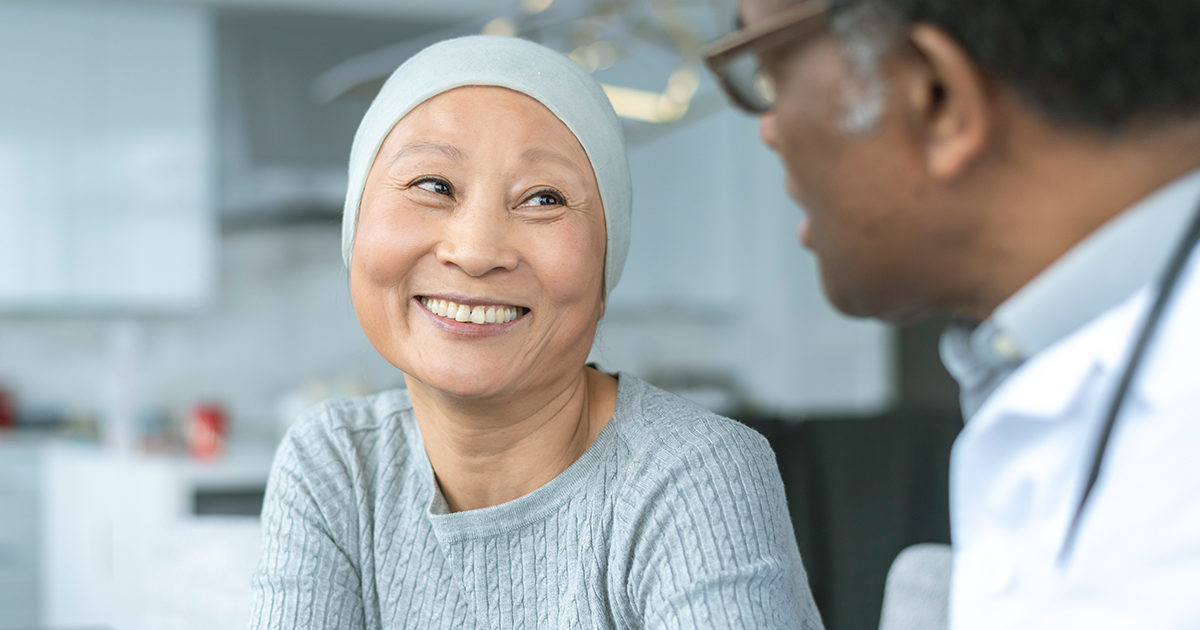About Thyroid Cancer
Your endocrine system is a set of organs and glands that produce hormones, which your tissues use to send signals to each other. Located at the front of your neck, the thyroid gland uses iodine to produce thyroid hormone, which regulates how your body uses energy. Although most thyroid nodules (abnormal growths on the thyroid gland) are not cancerous, the National Institutes of Health estimates that 1.2 percent of people in the United States will develop thyroid cancer at some point in their lifetime. Many treatment options are available for those diagnosed with thyroid cancer. The best way to address your condition will depend on your stage of cancer, other health concerns, and personal preference.
Types of Thyroid Cancer:
Different forms of thyroid cancer are distinguished by the cells in which the cancer originates. The two major cell types in the thyroid in which cancer develops are thyroid follicular cells, which secrete thyroid hormone, and parafollicular cells, which secrete a hormone known as calcitonin that helps regulate calcium levels in the blood.
Types of thyroid cancer include:
- Differentiated thyroid cancer: Cancer that develops in follicular cells and accounts for most instances of thyroid cancer
- Papillary thyroid cancer (PTC): Most common form of endocrine cancer and tends to develop slowly and can spread to the lymph nodes in the neck
- Follicular thyroid cancer (FTC): Form of thyroid cancer that can spread to other organs through the bloodstream
- Hürthle cell cancer: Relatively more aggressive form that comprises 5% of all differentiated thyroid cancers
- Anaplastic thyroid cancer: Rare and aggressive form of thyroid cancer believed to originate in follicular cells
- Medullary thyroid carcinoma: Rare form of thyroid cancer that originates in parafollicular cells and may be associated with an underlying genetic condition
Symptoms of Thyroid Cancer
Symptoms of thyroid cancer may vary, and many individuals with thyroid cancer do not experience any symptoms, especially in early stages of the condition.
Symptoms of thyroid cancer may include:
- Difficulty breathing
- Difficulty or pain when swallowing
- Lump in the neck, which may or may not be painful
- Voice changes/hoarseness
Risk Factors for Thyroid Cancer
Certain people are at greater risk for developing thyroid cancer.
Risk factors for thyroid cancer may include:
- Age: Thyroid cancer most commonly develops in individuals between the ages of 25 and 65.
- Family history: A family history of thyroid disease or thyroid cancer can increase an individual’s risk for the condition, as can several inherited genetic conditions. People of Asian descent are also more likely to develop thyroid cancer.
- Health history: A history of hypothyroidism can lead to thyroid cancer.
- Personal history: Research suggests radiation exposure may put you at risk of developing thyroid cancer.
- Sex: Female patients are more likely than male patients to develop thyroid cancer.
Treating Thyroid Cancer at UT Health Austin
Thyroid cancer treatment begins with a consultation in which an endocrine surgeon will evaluate your specific cancer and recommend an appropriate treatment approach. Your care team will work with you to determine the best course of treatment.
Care Team Approach
At UT Health Austin, we take a multidisciplinary approach to your care. This means you will benefit from the expertise of multiple specialists across a variety of disciplines caring for you in one place to avoid having to schedule multiple appointments with providers at locations all over the city. The Surgical Oncology Clinic team includes a fellowship-trained endocrine surgeon who specializes in diagnosing and treating cancerous and noncancerous conditions that affect the thyroid, parathyroid, and adrenal glands. Whether your endocrine condition is cancerous or not, the Surgical Oncology team works closely with your referring provider to provide integrated, whole-person care.
Through our Multidisciplinary Case Conferences, we collaborate with our colleagues at the Dell Medical School and The University of Texas at Austin to utilize the latest research, diagnostic, and treatment techniques, allowing us to identify new therapies to improve your treatment. We focus on applying advanced surgical techniques, including minimally invasive approaches, and nonsurgical treatments such as radiofrequency ablation. These procedures are offered with comprehensive attention to your complex needs, including medication management, nutrition, physical therapy, psychosocial wellbeing, and financial support. Advanced imaging and lab testing are also available on-site if needed.
Learn More About Your Care Team

Surgical Oncology
Health Transformation Building, 8th Floor
1601 Trinity Street, Bldg. A, Austin, Texas 78712
1-833-UT-CARES (1-833-882-2737)
Get Directions